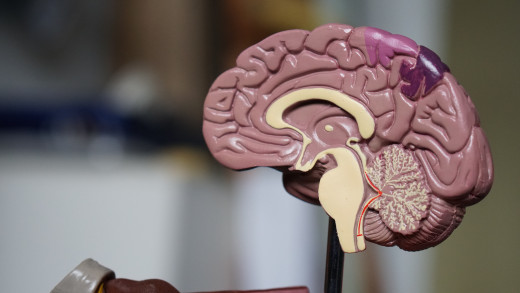- HubPages»
- Health»
- Quality of Life & Wellness»
- Personal Development
How to Increase Serotonin and Decrease Cortisol Naturally

What is Serotonin?
Serotonin is a neurotransmitter. A neurotransmitter is a chemical that communicates messages from one part of the brain to the other and also to other cells in the nervous system. It is primarily found in the central nervous system, blood platelets, and the digestive tract. It is also known as the ‘feel-good chemical’ as it plays a major role in regulating mood and is involved in our sense of well-being. Serotonin influences important functions of our body from emotions to motor skills. Low levels of this neurotransmitter can cause anxiety, depression, and sleep disorders. Serotonin levels can be increased through medication and also by natural methods

Functions of Serotonin
Serotonin has many important functions in the body. In the digestive tract it helps food move through the system as it helps in the contraction of intestinal muscles, it can also act on gut nerves signaling pain and nausea if there are irritants in the food. This causes more serotonin to be released which moves the food faster leading to diarrhea, this process also can induce vomiting. Serotonin is also stored in blood platelets. When a blood vessel gets damaged, platelets arrive blocking the breakage and release serotonin which helps trigger the blood vessels to narrow thereby stopping or slowing the loss of blood. Serotonin is believed to contribute to the feelings of well-being and happiness and it may affect sleep and appetite as well. Low levels of serotonin have been linked to depression and anxiety. For more on anxiety causes and types please read my hub:
https://hubpages.com/health/Anxiety-Disorders-And-Best-Natural-Remedies-For-Anxiety
What Causes Low Serotonin
There is no specific cause for low serotonin levels. It could be either the body does not produce enough, or your body is not using it efficiently. The reason for this may be having fewer or faulty serotonin receptors or the breakdown and absorption of serotonin may be too fast.
Genetic factors, faulty metabolism, digestive problems can impair the breakdown of food which reduces the serotonin secretion. Lack of sunlight, hormonal changes, poor diet all contribute to the imbalance. Vitamin deficiencies can also be responsible. Low levels of certain nutrients essential for serotonin production like vitamin B6, vitamin D, L-tryptophan, and omega-3 fatty acids, have also been linked to low levels of serotonin.
Treatment
Selective serotonin reuptake inhibitors and Serotonin-Norepinephrine Reuptake Inhibitors are generally prescribed in depression patients to improve the serotonin functioning. But these medicines can cause a lot of side effects. There are some simple natural remedies that help increase the serotonin levels without causing a host of side effects.




Natural ways to increase Serotonin Levels in the brain:
- Exercise: Aerobic exercises like cycling, swimming, jogging, brisk walking are very good for increasing the production of serotonin.
- Cold showers: Though these are very difficult at first, they can have long term benefits in maintaining the serotonin levels in the brain.
- Sunshine: Sunlight helps increase the production of serotonin as sunshine gives vitamin D which in turn boosts the serotonin levels in the brain. So spending at least 10 to 15 minutes outside each day is advised. But don’t forget to wear your sunscreen if you go out longer as it can harm the skin.
- Foods that help improve serotonin: Pineapples, eggs, cheese, Milk, Walnuts, Seeds like sesame seeds, hemp seeds, sunflower seeds, turkey, salmon, Pistachios and Tofu are all very beneficial. Eating foods rich in tryptophan can help the body synthesize an amino acid called 5htp which can then be converted into serotonin
- Good Sleep: Sleep regulates the circadian rhythms of our body and consistent good sleep is absolutely essential to improve serotonin
- Probiotics: Probiotics in the diet help increase the tryptophan in the blood which increases the serotonin levels. Eat less sugar because they give a temporary boost followed by a crash in the serotonin levels.
- Take steps to lower stress: Stress causes inflammation which affects the neurons that produce serotonin and it is a vicious cycle. Low levels of serotonin cause stress and stress deplete serotonin. To know more on reducing stress please read my hub: https://hubpages.com/health/PROFESSIONALS-AND-STRESS
- Massage therapy: Studies have shown that a good massage can not only increase serotonin but also dopamine and decrease cortisol.
- Vitamins: Vitamin B6 and B12 are important for serotonin production. Foods rich in vitamin B6 are avocado, bananas, grains, seeds, and nuts. Foods rich in B12 are cheese, fish, meat, broccoli, cabbage, and whole grams. Magnesium helps enhance serotonin. Magnesium can be found in foods such as greens, bananas, and fish.
- A positive mindset: Self-talk and doing things that you enjoy helps in increasing serotonin and decrease cortisol. A simple act of remembering happy events of your past enhances the serotonin levels in the brain.
Serotonin-The feel good chemical
A positive mindset-Self talk and doing things that you enjoy helps in increasing serotonin and decrease cortisol. A simple act of remembering happy events of your past enhances the serotonin levels in the brain.

What is Cortisol
Cortisol is the body's main stress hormone. It works with that part of your brain which controls your mood, motivation, and fear. It is produced by the adrenal glands, the Endocrinol glands located on top of our kidneys. It is our body’s "fight-or-flight" during a crisis. Cortisol plays an important role in many functions in our body like regulation of blood pressure, functioning of the immune system, and monitoring the usage of glucose in the body. Though Cortisol is necessary for important functions in the body, increased levels for longer periods can cause stress, anxiety, and depression.
Functions of Cortisol
Cortisol has two major functions. The first is to a breakdown of protein and fat to produce metabolites that can be converted to glucose in the liver. The second is to activate anti-stress and anti-inflammatory pathways in times of stress. Apart from these cortisol helps control blood sugar levels, regulates metabolism, helps reduce inflammation and maintaining the salt and water balance thereby control blood pressure. But too much cortisol can be harmful to the body. Apart from causing a disorder called Cushing Syndrome, it can lead to high blood pressure, stroke, anxiety, and depression. Therefore balancing this hormone is the key to a healthy life.
What causes increase in Cortisol
Generally, cortisol levels are higher in the morning when we wake up and fall throughout the day. This is called the diurnal rhythm. It is linked to daily activities. But in stressful situations, extra cortisol is released to help the body cope with the stress. The cortisol level decreases when the stressful episode recedes, thus regulates the level. In certain cases the elevated levels continue over longer periods which can lead to anxiety and depression and other harmful disorders. Corticosteroids taken in high doses for long periods can also increase the levels of cortisol. Too little cortisol also can cause Addison's disease, fatigue, dizziness, muscle weakness, darkening of the skin, weight loss and mood changes which can be dangerous if left untreated. Sometimes tumors of the Pituitary gland also cause impaired cortisol secretion. Hence an early assessment of the condition is imperative.
Treatment
Medications like Hydrocortisone and Fludrocortisone acetate are prescribed for the treatment of Addison’s disease. Generally, natural methods are effective in regulating the secretion of this hormone. There are simple ways to reduce the cortisol levels in our body.



How to Lower Cortisol Levels Naturally
- Morning routine: Write down three things you are grateful for. Training your brain to look for the good in things in life reduces stress hormones, increases confidence, happiness, and self-esteem
- Avoid sugar and saturated carbohydrates: Because they spike your blood sugar very high and when they come crashing down, it falls below the baseline level. When this happens your body goes into a panic that there is no sugar and signals the adrenaline glands to pump up a lot of cortisol into the blood, which increases the blood sugar. To avoid these blood sugar crashes, low glycemic carbs are good.
- Meditate: Meditation is one of the most effective tools for removing excess of cortisol in our bodies. Focus on breathing for 10 minutes every day.
- Exercise: We all know that exercise is good for health and very necessary to lead a disease-free, quality life. But studies have shown that too much exercise can increase the stress hormone. So find a balance and do not overdo where exercise is concerned. A brisk walk for 50 minutes a day is fine. If you choose an intense form of exercise then reduce the time say 30 to 40 minutes a day.
- Massage Therapy: A good massage relieves you of stress, anxiety and boosts your mood.
- Do something interesting every day: Doing something new or interesting every day increases the dopamine and keeps the cortisol level in check. To learn more on dopamine please read: https://hubpages.com/health/Importance-of-Dopamine-And-Methods-to-Improve-Dopamine-Naturally
- Art or Music therapy: Artistic activities like drawing, painting, sculpting or learning to play a musical instrument like the guitar, tabla, or keyboard can greatly relieve stress and improve your mood.
- Magnesium: Magnesium is the best medicine to keep anxiety and panic attacks at bay. Magnesium helps keep the blood sugar stable and also maintains the level of cortisol.
Final Thoughts
Prolonged stress, that is stress hormones operating throughout the day for many days is harmful to the body and cause the neurotransmitters in your brain like serotonin, the "feel-good" chemical that influences mood, appetite, and sleep, among other things to stop functioning properly, which can result in serious disorders like anxiety and depression. Persistent Stress over long periods elevates the level of cortisol in the blood which is very dangerous and can lead to major disorders like depression and other serious conditions such as hypertension, stroke or heart disease. The right balance is actually essential because they are on the opposite ends of the neurological seesaw.
But with a few simple techniques of stress management, the imbalance in the secretion of these neurotransmitters can be rectified and overall health can be maintained.
This content is accurate and true to the best of the author’s knowledge and is not meant to substitute for formal and individualized advice from a qualified professional.
© 2020 VIDYA D SAGAR


















